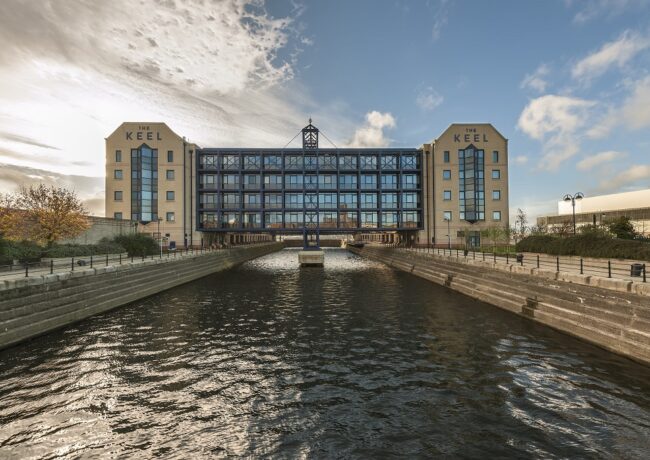Pipeline dwindling in Liverpool, says City Residential
The delivery of apartments in Liverpool city centre is slowing, according to the estate agent, which said that build-to-rent and social housing providers could be the main beneficiaries of the fractional sales market’s decline.
With a number of stalled schemes in the city, managing director Alan Bevan said that City Residential has revisited the existing pipeline to analyse how many approved and proposed schemes have a realistic chance of ever breaking ground.
Bevan noted that market conditions are “now less favourable than they have been in the past”, adding that “the fractional sales model that dominates the current market has definitely slowed”.
This model, where development is funded by off-plan sales of apartments to investors, often overseas, has been used on various projects in the city – some successfully, others less so, including those at projects connected to North Point Global and Pinnacle. Bevan however said that the decline in this market is not solely to blame.
He said: “While the issues over ‘stalled’ schemes have obviously had an effect on the market there are also concerns over Brexit, cautiousness over future price growth and worries around rental supply and demand.
“While this quarter has been busy we can’t help but feel that there may be a small storm brewing on the horizon. The continued uncertainty over Brexit, a slowing pipeline for development and questions of continued demand for fractional sale developments present a potentially challenging environment for the development community.”
Bevan said that although the volume of live development typically falls in the third quarter of the year as student accommodation schemes reach completion, the slack is usually taken up right away, but that the volume of planning applications has slowed.
Explaining further the drop-off in development, he said: “Many of the proposed developments with planning were also bought by developers using land options. With the expiry of these options coinciding at a time where the market is more challenging it is of little surprise to see some fall-off in anticipated developments.
“The recent announcement that the city has set up a councillor-led scrutiny panel to look into the wider issue of “fractional schemes” can only further highlight some of the market concerns that are prevalent.”
The other key factor in slowing development is the availability of prime land, Bevan said. He said: “While there is still a large amount of land in secondary areas to the north and south of the city there are very few prime sites in the city core left to develop. After a huge amount of permitted development office-to-resi conversions there is also a much reduced supply of further office buildings to convert.”
The troubles of developers working in the fractional sales market could spell opportunity for the private rented sector and registered providers, or housing associations, operators in each sector having been outbid on sites in recent years. Bevan said that that this is more likely to be visible on the secondary, peripheral sites where “values had risen too far too fast”.
The PRS market in particular is a positive for Liverpool, with The Keel being bought by Barings, strong interest in Cargo reported and Brickland bringing a project forward backed by Heitman.
The full quarterly report from City Residential is available online.





The damage that has been done to Liverpool’s overall profile by what has gone on is pretty undeniable, hence the begrudging concession.
However, the wider damage done to the Liverpool economy has yet to be accepted.
“Much reduced supply of further office buildings to convert” is I think a rather chilling line, since i would hope by now anyone with a vested interest in the long term economy would want to see a total end to these.
But I hope there will be no more for the time being although it is unfortunate that this has come at a cost of total economic slowdown and reverse. Low end bargains aside, there are now no meaningful profits to be had in the city, hence the dearth of development.
Liverpool’s population reaps the consequences of what a small number of asset strippers have sown.
By Mike
@ Mike… are we living in the same city?…
By Question...
Liverpool should, by rights in normal circumstances, be the country’s leading beneficiary of Brexit.
So why are any Brexit concerns apparently so problematic here, when both commercial and residential property still sells like hot cakes in Manchester?
Obviously, the conclusion can only be that the past decade has not in fact been a success, and that previous events as allowed to unfold have not been healthy for the city.
That where Manchester has chosen business, government and city building, Liverpool’s choice of puppets, stag party hotels, box extensions, student flats, and of course turfing businesses out so their office space can be “converted” and flogged off, hasn’t worked out quite as well.
Surprising no one except those who perhaps would rather pretend otherwise.
By Mike
The 2017 EY foreign investment report put our city at 17th. Behind Warrington, Coventry and.. Barnsley.
Going from fastest growing city economy in 2008, to that, isn’t so much a reversal as a collapse.
By Mike
Mike, can we book you for our Christmas party?
By Just saying
@Mike seriously ?????
By Sarah
@Mike dearth of development? The current crane count in the city aside from London sits only behind Manchester and Birmingham at present. So if Liverpool is struggling, then god knows how bad it must be in some other cities…
Office to resi is a contributor to some of the cities issues, but more so the lack of creation of new A grade office stock to replace it. We have the spine and the rest of Paddington Village gearing up, and further proposals for Pall Mall offices to push on with. Not everything is right, but its far from your doom and gloom outlook…
By L19
@Mike you work for PNW OR GRANADA REPORTS .
By Sarah
Ah, that old chestnut: “Uncertainty caused by Brexit.”
We were told by everyone from the IMF to the World Bank, our Chancellor to the EY Item Club that the very day after the nation dared vote to leave the EU our economy would fall off a cliff.
Many put figures to their claims for an added burnish of credibility – and to look like there was something more than group think behind their proclamations.
As we now know, the exact opposite happened and thirty months of unbroken economic growth since a few reputations are looking a little bruised.
The fall in the pound has actually helped the fractional sales model, I am reliably informed, as Britain now offers greater value. I think Mr Bevan’s comments about option agreements are actually far closer to the mark, as the fractional developers like Elliot Group and X One keep cracking on and delivering.
And @Mike: you need to stop putting bromide in your tea.
By Sceptical
I would like to formally request that PNW requests Mikes opinion on all future articles. He’s like a young Paxman (pre-University Challenge).
By JustAFan
It pains me to say but Liverpool Developers should take a page from there counterparts in Manchester where they buy sites and build on them unlike in Liverpool where it appears sites are acquired and then flipped and then flipped again until the developer holding the parcel can’t afford to build on it as the price of the site provides little return when build cost are taken into account. Let Liverpool Developers be Developers and not Flippers.
By IR